
BRASILIA - By Lucy Jordan
Almost 37 years after his death, Brazil’s former President, João Goulart, was exhumed Wednesday to determine if he had been murdered, as Latin America’s largest country took another step towards resolving unanswered questions about its former military dictatorship.
Leftist Goulart, known as Jango, was president from 1961 until 1964, when he was deposed in a military coup. He fled to Uruguay, and subsequently to Argentina. He died in exile on his farm in Mercedes, Argentina, in 1976, apparently of a heart attack.
Doubt were raised over his death in 2006, when a former Uruguayan intelligence officer, Mario Neira Barreiro, told Jango’s son Jango João Vicente Goulart that he had been part of a plot to swap Goulart’s medication for poison. Barreiro claimed to have been working at the behest of Operation Condor, a secret scheme waged jointly by leaders of Southern Cone dictatorships to eliminate dissidents and threats across each others borders.
No post-mortem examination had been carried out to ascertain the cause of death in 1976.
Jango’s family asked the government to reopen the investigation. Brazil’s Truth Commission, founded to help the country come to terms with its violent past, agreed this year to dig up Jango’s body for examination.
"There are many documents and testimony that point to this suspicion. Precisely for this reason is doing the exhumation, in order to get more clues,” João Marcelo Goulart, Jango’s grandson, told Globo news. “Exhumation is only part of the process. There are other factors, such as listening to former agents and declassifying documents to get the closer to the truth."
Jango is interred with 9 other family members in a family crypt in Sao Borja, close to the border with Argentina.
On Wednesday, Jango’s grandson João Marcelo Goulart, as well as experts from Uruguay, Argentina, Brazil’s Federal Police and the International Committee of the Red Cross were present for the exhumation process.
Jango’s body is scheduled to arrive in Brasilia, the capital, on Thursday morning, where there will be a special ceremony, attended by President Dilma Rousseff.
Truth and reconciliation for Brazil’s ugly past
Brazil’s military dictatorship lasted from 1964 until 1985. Although it was significantly less bloody than those in neighbouring Argentina and Chile, some 500 people were killed or disappeared, while more than 50,000 people were detained and 10,000 forced to go into exile, according to research by Paulo Roberto Filho of Yale University.
In 2011, President Rousseff passed a law setting up a Truth Commission to investigate the events of Brazil’s military rule, despite strong opposition from former rulers of the junta, many of whom live freely amongst the people they formerly oppressed.
Critics of the Commission called it toothless: Those investigated and found accountable could not be convicted due to a 1979 law granting total amnesty to anyone involved in politically motivated crimes during the dictatorship, including torture and murder, either on the side of the military leaders, or of dissidents.
Other famous cases of exhumation include Chilean poet Pablo Neruda, who was recently exhumed to examine claims that he might have been murdered by the right-wing regime of Genera Augusto Pinochet. The Chilean Forensic Service said last week that no poison had been found in Neruda’s system.
Also last week, Swiss forensic reports, published by al-Jazeera and the Guardian, said that tests on the exhumed body of Palestinian leader Yasser Arafat "moderately support the proposition that the death was the consequence of poisoning with polonium-210".
Anadolu Agency website contains only a portion of the news stories offered to subscribers in the AA News Broadcasting System (HAS), and in summarized form. Please contact us for subscription options.

